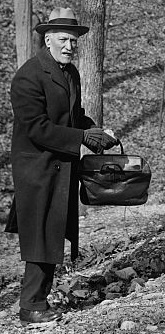| This article needs additional citations for verification. Please help improve this article by adding citations to reliable sources. Unsourced material may be challenged and removed. Find sources: "Walter Hough" – news · newspapers · books · scholar · JSTOR (December 2009) (Learn how and when to remove this message) |
| Walter Hough | |
|---|---|
 Walter Hough in 1904 Walter Hough in 1904 | |
| Born | 1859 Morgantown, Virginia, United States |
| Died | 1935, aged approximately 76 |
| Alma mater | West Virginia Agricultural College, West Virginia University |
| Awards | Order of Isabella |
| Scientific career | |
| Fields | Ethnography, archaeology |
| Institutions | Smithsonian Institution |
Walter Hough, Ph.D. (April 23, 1859–1935) was an American ethnologist who worked for the Smithsonian Institution.
Life
Hough was born at Morgantown, Virginia. He was educated at Monongalia Academy, West Virginia Agricultural College, and West Virginia University (A.B., 1883; Ph.D., 1894). He was employed at the Smithsonian National Museum of Natural History as an assistant (1886–1894), as assistant curator of ethnology (1896–1910), and as curator from 1910 until his death in 1935. Though Hough's work revolved around cataloging the museum's collections, he also spent time doing archaeological field work in the American Southwest. In 1905, Hough unearthed preserved cobs of maize in a cave in New Mexico that helped subsequent archaeologists determine that the Mogollon ethnic group inhabited the area before the Anasazi Puebloans, who were previously considered to be the area's earliest inhabitants.

In 1892, Hough was made Knight of the Order of Isabella when in Madrid as a member of the United States Commission. He was also a member of Dr. J. Walter Fewkes' expedition to Arizona (1896–1897).
Publications
- "Censers and incense of Mexico and Central America"—full online copy at HathiTrust
Family
Hough married Myrtle Zuck, a botanical collector, of Holbrook, Arizona on the 29 December 29, 1897.
References
- HOUGH, Walter, in Who's Who in America (1901-1902 edition); p. 558; via archive.org
- ^ Judd, Neil M. (July 1936). "Walter Hough: An Appreciation". American Anthropologist. 38 (3): 471–481. doi:10.1525/aa.1936.38.3.02a00110. ISSN 0002-7294.
- Mann, Charles C. (November 2018). "What Ancient Maize Can Tell Us About Thousands of Years of Civilization in America". Smithsonian Magazine. Retrieved 2018-12-19.
- Hough, Walter (1912), "Censers and incense of Mexico and Central America", Proceedings of the United States National Museum, vol. 42, no. 1887, Washington: Smithsonian Institution Press (etc.) (published 7 April 1912), pp. 109–137, doi:10.5479/si.00963801.42-1887.109, hdl:2027/gri.ark:/13960/t5z60gv4v, ISSN 0096-3801, retrieved 16 April 2010
External links
 Works by or about Walter Hough at Wikisource
Works by or about Walter Hough at Wikisource- Works by Walter Hough at Project Gutenberg
- Christy G. Turner, II and Jacqueline A. Turner, "The First Claim for Cannibalism in the Southwest: Walter Hough's 1901 Discovery at Canyon Butte Ruin 3, Northeastern Arizona", American Antiquity, Vol. 57, No. 4 (Oct., 1992), pp. 661–682
This article about an American scientist is a stub. You can help Misplaced Pages by expanding it. |